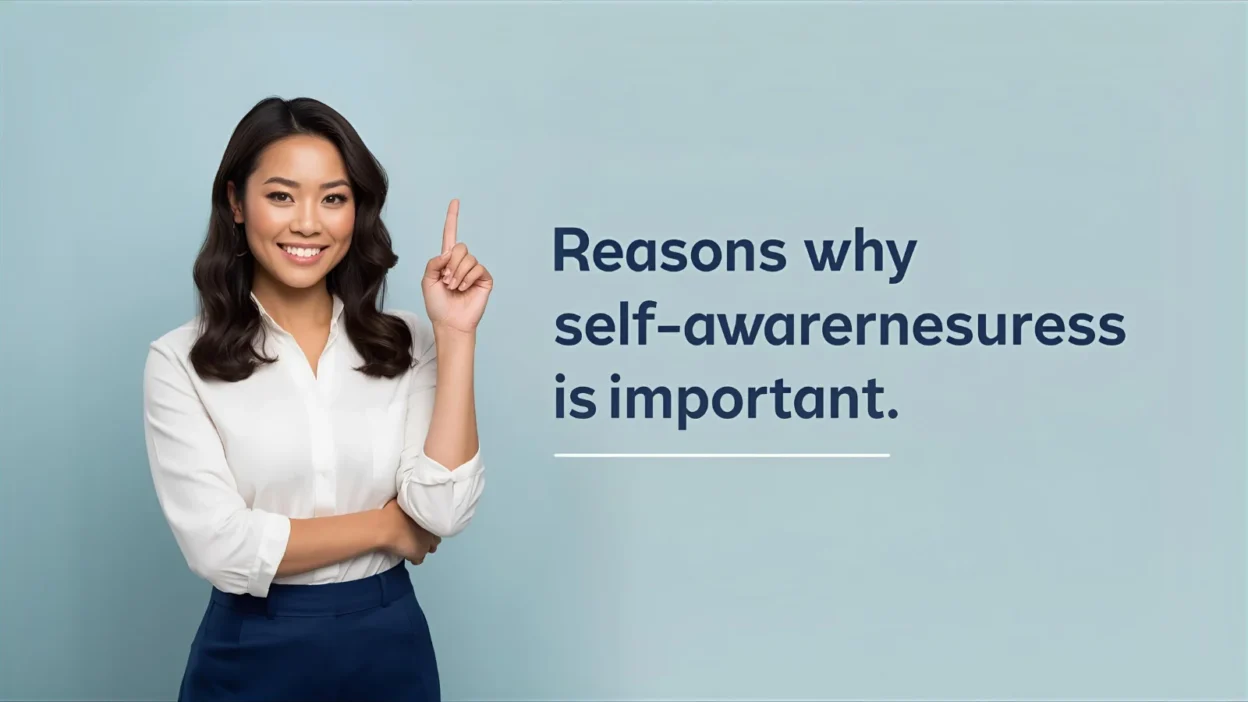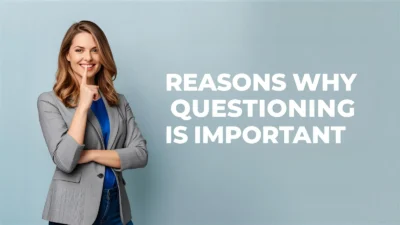Have you ever wondered why some people seem calm, confident, and in control—no matter the situation?
The secret often lies in one simple yet powerful trait: self-awareness.
Self-awareness is the ability to understand your own emotions, thoughts, strengths, and weaknesses. It’s about knowing who you are and why you do what you do. Without it, we often act on autopilot—reacting, not responding, and drifting without purpose.
In this guide, you’ll discover the 56 meaningful reasons why self-awareness is important in every part of life—from relationships to careers, mental health, and leadership.
1. Self-Awareness Builds Emotional Intelligence
Self-awareness is the foundation of emotional intelligence (EQ)—the skill of recognizing, understanding, and managing your own emotions and the emotions of others.
When you know what triggers your feelings, you can handle conflicts calmly and communicate better.
🧠 Example: Instead of snapping during stress, a self-aware person might say, “I’m feeling overwhelmed right now—can we revisit this later?”
💬 Quote: “Knowing yourself is the beginning of all wisdom.” – Aristotle
2. It Improves Decision-Making
When you understand your values and motives, you make clearer and more confident decisions.
Self-aware people rarely follow the crowd—they think for themselves and make choices that align with their goals.
🎯 Example: A self-aware student chooses a career path that matches their passion, not just what others expect.
3. Self-Awareness Enhances Communication
Knowing yourself helps you express thoughts clearly and listen actively.
It allows you to speak with empathy and confidence, leading to better relationships at home and work.
🗣️ Example: A self-aware leader knows when to speak and when to listen—turning conversations into connections.
4. It Reduces Stress and Anxiety
When you understand your emotional patterns, you can predict and manage stress before it grows.
Self-awareness acts like an emotional compass—helping you stay grounded when life feels chaotic.
🧘 Example: Recognizing that you get anxious before deadlines helps you plan ahead and stay calm.
5. It Encourages Personal Growth
Self-awareness turns mistakes into lessons.
Instead of feeling defeated, you ask, “What can I learn from this?”
This mindset transforms setbacks into opportunities for growth.
🌱 Example: After a failed project, self-aware individuals reflect on what went wrong instead of blaming others.
6. It Strengthens Relationships
When you’re aware of your emotions, you’re more understanding toward others.
You can empathize, apologize sincerely, and resolve conflicts without ego getting in the way.
💞 Example: Recognizing when you’re being defensive can save a friendship or partnership from unnecessary tension.
7. Self-Awareness Boosts Confidence
Knowing your strengths gives you courage.
Instead of comparing yourself to others, you celebrate your own progress.
💪 Example: A self-aware artist embraces their unique style rather than trying to copy trends.
💬 Quote: “Confidence comes not from always being right, but from not fearing to be wrong.” – Peter T. McIntyre
8. It Promotes Better Leadership
Great leaders lead themselves before leading others.
Self-aware leaders understand their impact on a team. They listen, adjust, and inspire trust through authenticity.
👔 Example: A manager who admits their mistake builds more respect than one who hides it.
9. It Helps You Control Impulsive Behavior
We all have emotional triggers—but self-awareness gives us the power to pause.
Instead of reacting instantly, you take a breath, reflect, and respond wisely.
⚖️ Example: When someone criticizes you, you respond thoughtfully instead of lashing out.
10. It Increases Accountability
Self-aware people take responsibility for their actions.
They don’t make excuses or shift blame—they own their choices and learn from them.
🧾 Example: “I missed the deadline because I mismanaged my time. Next time, I’ll plan better.”
That level of honesty builds credibility and maturity.
11. It Helps Identify Strengths and Weaknesses
Knowing your skills lets you maximize potential—and knowing your weaknesses helps you improve.
Self-awareness is like holding a mirror to your soul—it reveals where to grow and how to shine.
🔍 Example: A writer who knows they struggle with time management sets clear deadlines and routines.
12. It Makes You More Adaptable
Self-awareness helps you embrace change instead of fearing it.
When you understand your inner self, you can adjust to new environments and challenges without losing your sense of identity.
🌍 Example: Self-aware employees adapt faster to company changes and remain resilient under pressure.
13. It Fosters Mindfulness and Presence
Being aware of yourself means being present in the moment—not lost in regrets or future worries.
🧘 Example: During conversations, you listen fully rather than planning what to say next.
Self-awareness and mindfulness go hand in hand, nurturing peace and clarity.
14. It Leads to Greater Happiness
Happiness isn’t just about success—it’s about alignment.
When your actions match your values, you feel fulfilled.
💬 Example: A self-aware person who values family ensures work-life balance, finding deeper joy in everyday life.
15. It Builds Authenticity and Integrity
Self-awareness helps you live authentically, without pretending to be someone you’re not.
It aligns your inner world with your outer actions—creating integrity.
✨ Quote: “To be yourself in a world that is constantly trying to make you something else is the greatest accomplishment.” – Ralph Waldo Emerson
🌟 Idioms and Phrases About Self-Awareness
| Idiom | Meaning | Example |
|---|---|---|
| “Know yourself” | Understand your emotions and values | True confidence starts when you know yourself. |
| “Take a hard look in the mirror” | Reflect honestly on your actions | It’s time to take a hard look in the mirror. |
| “Face the music” | Accept responsibility | Self-awareness helps you face the music gracefully. |
| “In touch with yourself” | Understand your feelings | Meditation keeps you in touch with yourself. |
| “Come to your senses” | Regain awareness or clarity | After reflection, he came to his senses and apologized. |
🧩 Synonyms and Related Words for Self-Awareness
| Term | Meaning | Example |
|---|---|---|
| Self-knowledge | Understanding one’s personality | Self-knowledge is key to personal growth. |
| Introspection | Looking inward to reflect | Journaling encourages introspection. |
| Consciousness | Awareness of self and environment | Meditation increases consciousness. |
| Mindfulness | Present-moment awareness | Mindfulness helps reduce anxiety. |
| Self-realization | Understanding your true potential | Yoga fosters self-realization. |
✍️ Grammar Tip: Using “Self-Awareness” Correctly
- Noun: Self-awareness is vital for emotional growth.
- Adjective: A self-aware person communicates effectively.
- Related verb: Reflect, recognize, understand.
✅ Correct: She practices self-awareness through meditation.
❌ Incorrect: She self-awarely speaks every day.
🌿 Real-Life Example: How Self-Awareness Transformed a Leader
Satya Nadella, CEO of Microsoft, credits his success to self-awareness.
He focused on empathy and introspection, transforming Microsoft’s culture from competition to collaboration.
💬 Lesson: Knowing yourself isn’t weakness—it’s leadership power.
💭 Practical Ways to Develop Self-Awareness
- Keep a journal — Reflect on daily emotions and actions.
- Seek feedback — Ask friends or mentors how they perceive you.
- Practice mindfulness — Observe your thoughts without judgment.
- Pause before reacting — Take a breath and think.
- Set personal goals — Identify habits you want to change.
Small, consistent reflection leads to lifelong growth.
❓ FAQs About Self-Awareness
Q1: What does self-awareness mean in simple words?
It means understanding your feelings, thoughts, and behavior — and knowing how they affect others.
Q2: Why is self-awareness important in relationships?
It improves empathy, communication, and conflict resolution by helping you understand both your emotions and your partner’s.
Q3: How can I improve self-awareness?
Through mindfulness, journaling, feedback, therapy, or simply taking quiet moments to reflect.
Q4: Is self-awareness a skill or a trait?
It’s both — a natural trait you can strengthen with practice.
Q5: Can too much self-awareness be harmful?
Overthinking isn’t the same as awareness. Healthy self-awareness helps you act, not spiral in doubt.
🌼 Conclusion
Self-awareness isn’t about perfection — it’s about understanding and accepting yourself.
It’s the compass that guides emotional balance, meaningful relationships, and authentic success.
When you know who you are, you stop chasing validation and start creating purpose.
💬 “Until you make the unconscious conscious, it will direct your life and you will call it fate.” – Carl Jung
So take time to reflect, listen to your inner voice, and grow from within — because self-awareness is the first step toward becoming your best self.

Sara Taylor is a content writer at Whygenix.com, creating clear, engaging articles that simplify complex ideas, helping readers understand the why behind topics in education, lifestyle, and personal development.




